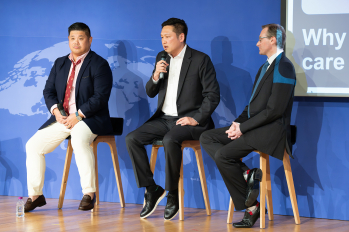
“The nominal guys who often claim ‘Jesus’ are really harmful,” Huang remarked bluntly.
Their lives lacked a genuine testimony of faith.
Before embracing Christianity, Huang met many people who frequently spoke about Jesus. However, despite their seemingly spiritual language, their lives lacked a genuine testimony of faith. Huang refers to these individuals, Christians who “talk the talk but can’t live out the faith,” as “Jesus guys.”
It is concerning that those sent out by churches with good intentions to share the gospel gradually become the off-putting “Jesus guys.” They would enthusiastically invite others to attend events, such as warm dinners or lively performances, and always conclude with an altar call for a commitment to Jesus.
This blunt and utilitarian method of evangelism tended to make people feel uncomfortable, even causing resistance. Many people not only refused to return to church but even became averse to hearing the name of Jesus.
“If this approach were correct, why is the result so poor, and why are people so unwilling to accept it?” Huang questioned. “If everything is driven by an ulterior motive, then it is incorrect.”
Huang advocates influencing others through one’s life and actions, which means preaching by living out the truth. He warns against becoming a “Jesus guy,” who talks without acting and uses biblical truth to pressure others.
Building friendships and sowing seeds of faith
Huang has a gift for building deep, authentic relationships. Through his work in financial management and consulting, he has established initial trust with many clients. These professional relationships often evolve into genuine friendships, as he continues to keep in touch beyond the workplace. In relaxed conversations, Huang can discern people’s needs and offer thoughtful, practical advice. His sincere care has earned him the respect of many, not only as a mentor but also as a trusted friend.
“Their problems become my problems,” Huang shared. “They often come to me for advice on different matters. I frequently pray for them and offer guidance.”
“Over time, I realized that the advice I give comes from the Bible,” he thought. “Why not encourage them to go directly to the source and seek Jesus for themselves?” He gradually began introducing them to the Scriptures and guiding them toward understanding. Some began taking his advice on seeking Jesus themselves.
You need to believe in Jesus.
Subsequently, some would ask him, “Teacher, if I want to be like you, understanding the Bible and having God in my life, what should I do?”
Huang would simply respond, “You need to believe in Jesus.”
When they asked how, he would patiently begin leading them on the path of faith.
Guiding faith requires going the extra mile
“I realized that leading people to believe in Jesus doesn’t mean pushing them into the water or forcing a decision all at once,” said Huang. “If you pressure them too much, it creates resistance. They’ll stop listening and even avoid you when they see you.”
Huang’s method is to go the extra mile. He focuses on helping people with their real-life problems without initially mentioning Jesus or promoting religion. Once their needs are addressed, he says, "they will return with thirst".
He acknowledges that this journey of walking alongside others can be long and challenging, but through this companionship, many begin to transform, and faith in Christ often becomes a natural next step.
The way of influencing lives through your own life by being salt and light first.
“When you consistently guide others using biblical principles, they live by the truth,” Huang explained. “At that point, all that’s left is for them to speak it out loud. Once they do, they have already transformed into the life of a mature believer.” Huang noted, “This is not the way of a ‘Jesus guy.’ It’s the way of influencing lives through your own life by being salt and light first.”
A different kind of faith community
Whether online or face to face, Huang has always upheld biblical principles in managing relationships. Therefore, he has influenced and guided many friends across various regions to come to faith in Jesus.
Just as the saying goes, “A tree grows into a forest without intention.” As the number of believers continued to grow, the need to establish a church became inevitable. However, with members scattered across the country, Huang boldly pioneered a virtual faith platform for everyone to share and exchange—”Church on the Air.”
Unlike traditional churches, an online church has no physical location. Its gatherings take place entirely online, except for one in-person annual meeting. The church emphasizes mutual support and living out faith in everyday life. Today, the members of the online church remain committed to studying the Bible and engaging in close fellowship. Their lives are also influencing family members, friends, and colleagues around them.
Redefining the possibilities of the contemporary church.
This “different kind of faith community” is redefining the possibilities of the contemporary church. Here, faith is no longer confined to doctrinal sermons but is expressed through authentic, lived testimony. The church is no longer just a building of bricks and mortar but a spiritual home where hearts connect and uplift one another.
Originally published by ChinaSource. Republished with permission.
Written, translated, or edited by members of the ChinaSource staff, often from original material published in Chinese languages. In this instance, this article was originally published in Chinese by the Christian Times and the English version was published by China Christian Daily, which ChinaSource republished.
ChinaSource is a trusted partner and platform for educating the global church on critical issues facing the church and ministries in China, and for connecting Christians inside and outside China to advance the kingdom of God globally. ChinaSource's vision is to see the church in China and the global church learning and growing together, engaging in ministry that powerfully advances the kingdom of God.





